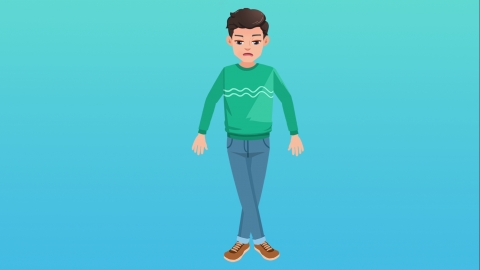What are the causes of dizziness when squatting down?
Generally, possible causes of dizziness upon squatting or standing up include rapid changes in body position, dehydration, hypoglycemia, anemia, and insufficient cerebral blood supply. These conditions require symptomatic management through general treatments or medication. If symptoms persist, it is recommended to seek timely medical advice for appropriate treatment. Detailed explanations are as follows:

1. Rapid Change in Body Position
When a person stands up quickly from a squatting position, gravity causes blood to flow toward the lower body, temporarily reducing blood flow to the brain, which leads to transient hypotension and dizziness. Besides dizziness, this may also be accompanied by symptoms such as blurred vision and tinnitus. It is recommended to change positions slowly, allowing the body sufficient time to adjust.
2. Dehydration
Dehydration may occur due to insufficient water intake or excessive fluid loss. Dehydration reduces blood volume and lowers blood pressure, resulting in inadequate cerebral perfusion, especially during rapid squatting or standing, which can cause dizziness. Other symptoms may include thirst, dark urine, and fatigue. It is recommended to replenish fluids promptly, particularly after physical activity or during hot weather, by drinking adequate amounts of water.
3. Hypoglycemia
Hypoglycemia mainly occurs due to inadequate food intake or excessive blood sugar reduction. When individuals with hypoglycemia squat or stand, the brain experiences dizziness due to insufficient energy supply. Hypoglycemia may also be accompanied by symptoms such as sweating, trembling, and hunger. It is recommended to immediately consume sugary foods or beverages, such as glucose tablets or fruit juice, and follow medical advice to use medications like glucose and sodium chloride injection, hydrocortisone tablets, or mannitol injection to alleviate symptoms.
4. Anemia
Anemia is caused by reduced iron intake or excessive iron loss. When the body suddenly stands from a squatting position, blood must overcome gravity to reach the head. At this time, the oxygen content in the blood may be insufficient to meet the brain's demands, causing dizziness. Symptoms may include pallor, fatigue, and difficulty concentrating. Patients are advised to take medications such as ferrous sulfate sustained-release tablets, iron(II) fumarate tablets, or ammonium ferric citrate-vitamin B1 syrup II under medical supervision.
5. Insufficient Cerebral Blood Supply
Insufficient cerebral blood supply occurs due to narrowed arterial vessels or vascular spasms, which reduce blood flow to the brain. When the body suddenly stands from a squatting position, the change in head position may further decrease cerebral blood supply, causing dizziness and other symptoms, such as headache, memory loss, and difficulty concentrating. Patients may use medications such as aspirin enteric-coated tablets, clopidogrel bisulfate tablets, or rivaroxaban tablets under medical guidance to improve blood circulation.
It is recommended to engage in regular physical exercise, performing aerobic activities such as jogging or cycling 3 to 5 times per week to enhance cardiovascular function and improve the body's adaptability to positional changes.






